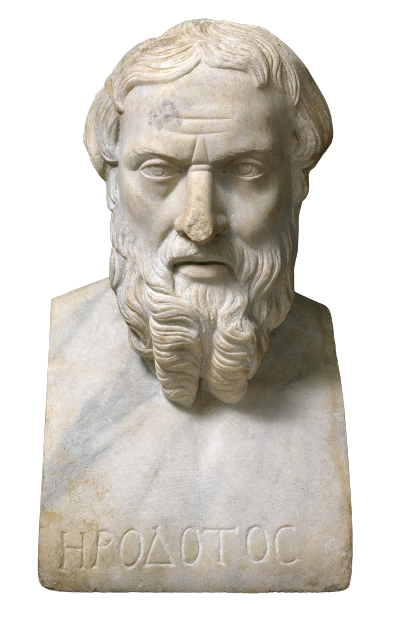
Who was Herodotus? (484?-425 B.C.) Herodotus is known as the “Father of History”, Herodotus described the culture and events of many ancient kingdoms, including Media-Persia, Assyria, Egypt, among others. In particular, he recorded the epic struggle between Persia and Greece, whom he depicted as representative of East and West
Historical context. Herodotus’ life spanned the Greek wars with Persia (490-479 BC) and the beginning of the Peloponnesian War (431-404 B.C. The first phase of the former occurred in 490, when the Greek hoplite infantry drove Darius’ forces from the field of Marathon. Pheidippides, a Greek soldier, ran 20 miles to announce the victory in Athens and immediately dropped dead; the Olympic Marathon was later set up in his honor. Ten years afterward, the Persians returned under Xerxes I and were held off for three days by 300 Spartans under king Leonidas I at the pass of Thermopylae. That gave Athenians time to evacuate and mobilize to defeat the Persian navy in the narrow channel of Salamis (480 B.C.). That victory gave Athens the confidence to deliver the coup-de-grace to the Persian infantry at Plataea.
The celebration of a united and victorious Greece was short-lived because Athens began to press her advantage. The various city-states divided into two leagues, one headed by Sparta on the Peloponnesus isthmus and the other – the Delian League — led by Athens. Named after its treasury on the island of Delia, the latter required an oath of perpetual allegiance from its members and a tribute of naval armaments. Most of the Delian League elected to pay a cash tribute and allow Athens to build and equip the navy, thus surrendering effective control of the League to Athens.
Athens, under Pericles, began to pursue an expansionist policy, seemingly inconsistent with Pericles commitment to democracy. But Athens overreached herself by pressuring Corinth, a member of the Spartan alliance, for trade advantages. That was the spark that ignited the Peloponnesian War.
Summary of Herodotus’ teaching. Herodotus’ History of the Persian Wars may be divided into two broad categories. The climax of his work (Books v-ix) lies in his description of the Persian Wars with Greece: the initial invasion which was repelled at the Battle of Marathon in 490 and the second phase 10 years later. As a prelude to these decisive Greek victories, Herodotus devotes considerable time to the growth of the Persian Empire and its conquests of Lydia, Egypt, Persia and others (Books i-iv).
He employs a fascinating, anecdotal style, which has been often criticized for its inaccuracies. However, Herodotus is usually careful to preface questionable passages with qualifiers such as “they say, but I do not believe it” and often presents several different interpretations without himself passing judgment. “I know not what the truth may be,” he said, “I tell the tale as ‘twas told to me” (1). With few written records to reference and working years after the fact, Herodotus was forced to make heavy use of oral tradition, which he gathered in his extensive travels.
Relying heavily on Homer, Herodotus does not hesitate to draw a connection between events on earth and the activity of the Greek gods working behind the scenes. For example, he presents the Persian Wars as an outcome of, and descending from the Trojan War. Athens had welcomed the historian and he in turn treated her kindly, finding justification for her expansionist tendencies.
Implications for subsequent history. Without Herodotus much of our knowledge of the Persian culture and the Persian Wars would be woefully incomplete. The works of virtually all of the ancient writers (Herodotus, Virgil, Homer, etc.) had borne witness to the despotism of the gods and demonic activity over everyday life in the pagan world (2). Later on, Plutarch laments the repression of the heathen gods after the advent of Christ in his book Why Oracles Came to Fail”.
Biblical analysis. According to Cowan and Guinness, “Herodotus’ genuine interest in other cultures reflects his insight that all human beings have nobility and worth, a necessary first step toward the universal promise of the gospel of Christ. He does not distinguish pejoratively between Greeks and barbarians – the Persian kings are as noble as the best Athenians and are as prone to hubris as the Greeks” (3). However, Herodotus is mysteriously silent about the Biblical record and the state of the Hebrews, who had only recently been restored to Palestine by the Persians. Then as now, humanists prefer to marginalize or ignore the biblical record and its exalted role as the centerpiece of history.
The title “Father of History” is therefore contested because Moses “Table of Nations” in Genesis 10 predated Herodotus by 1,000 years. It lists the heads of 70 nations stemming from Noah after the flood.
Corrective or Prescriptive Actions. It is customary to view the Athenian victory over Persia as a victory of enlightened democracy over barbarianism. In reality it was a culture of humanism triumphing over a nation that respected the rule of law and nurtured the people of God in their time of extremity. The Bible is generally complimentary of Persia and her kings. Athens cultural achievements must be evaluated in this light.